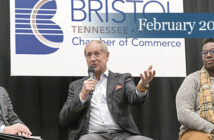“You are 40 young men and women who are making a difference in your home and your workplace and in your community. You are 40 of the reasons we have a bright future as we look toward a tomorrow that is increasingly interconnected and globally competitive – and for the record, you are 40 people who would all make better presidential candidates than the two we have to choose from.”
– Dr. Bill Greer, Milligan College president, speaking at The Business Journal’s 40 Under Forty gala, Oct. 14*
By Scott Robertson
Dr. Greer’s comment above was met with great applause. It was clear he had found and tapped into a rich vein of disappointment in the choice of Donald Trump v Hillary Clinton. Many of the young professionals in the room (and the not-as-young professionals as well) agreed with Greer’s assertion that neither candidate for America’s chief executive post created much in the way of inspiration.
As Greer spoke, it became apparent he was not engaging in hyperbole or just going for easy applause by telling the 40 honorees he considered them better presidential material than Mr. Trump or Secretary Clinton. The argument he put behind that assertion was compelling. He referred to Robert Greenleaf, who coined the term “servant leadership.”
“Servant leadership begins with the natural feeling that one wants to serve first. It isn’t something you learn or are taught. It’s natural. That’s saying a lot about human behavior and character at a time when people are so often thought of as self-centered, and who are constantly looking out for No. 1.”
I think Greer is onto something here. If you look back at the presidential elections in my lifetime, the candidate who better conveyed the sentiment that he cared for the average American (more than his opponent has) has generally been victorious. Jimmy Carter, Ronald Reagan, Bill Clinton, George W. Bush, Barack Obama – all convinced the winning margin of voters he cared about their problems more than he cared about wielding power. Just so, Bob Dole, Al Gore, John Kerry, John McCain and Mitt Romney all left voters with the opposite impression.
Both major party candidates in this election struck me, and apparently most voters, as self-centered individuals. I think that’s a big part of why many Americans saw no great benefit in voting for either.
“A servant leader cares about the growth and well-being of others as well as their communities,” Greer told the honorees. “Servant leaders are not afraid of sharing power. They put the needs of others first, and that helps others reach their full potential. What happens when the members of a team all reach their full potential? Success.”
You see, to me, what Dr. Greer was talking about sounds like a real first step in making America great again. Electing leaders whose philosophy is about Americans building each other up instead of tearing each other apart – leaders who don’t want their followers to have t-shirts that say, “I’m with her,” but rather, “She’s with us.”
Greer hit the nail on the head when he said, “I don’t think we’re seeing a lot of servant leadership in the presidential race this year.”
“Instead of a servant-first attitude, we’re seeing a leader-first attitude,” Greer said, “the kind of attitude that comes from people who care more about the amount of power or the amount of control they have instead of the amount of influence they have. For you see, true influence doesn’t come from control or power. It comes from the ability to cast a vision in a way that leads others toward a common goal. Others will not follow, voluntarily at least, unless there is trust, confidence and shared values.”
The 40 young men and women whom we honored Oct. 14 are proof that servant leadership still exists at the local level. But if we are to stem the decline of American greatness, we must foster a political environment in which those leaders are allowed to bring that philosophy back to positions of national leadership.
Clinton and Trump were willing to tear apart not just the nation, but even their own parties in their personal quests for power. It is desperately important that on the local and state level, we begin to bring forward leaders who will put the needs of all whom they represent before their own short term goals, or even those of their party. Those are the men and women we must lift up.
While we have squabbled among ourselves, our rivals in the world have grown stronger, economically and militarily. We must find leaders capable of uniting us. And we should look to our servant leaders first.




